Cardiff: Congestion charge considered by council
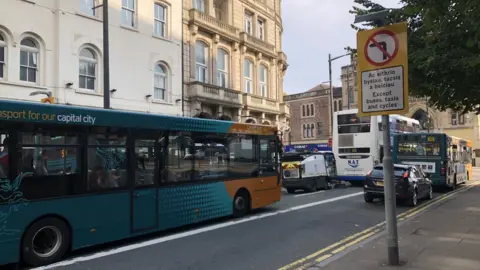 BBC
BBCA congestion charge to tackle traffic levels in Wales' capital is being considered amid concern over pollution.
Cardiff council said public transport improvements, such as £1 bus fares on key routes, needed to be in place before the introduction of any payment.
It has not provided any details of the cost or the area in which the charge could apply.
If given the go-ahead, the scheme could take up to five years to implement, the council said in a statement.
Councillors will consider a report into the proposal on 27 April and, if they agree to move ahead with the plans, will look at different schemes including road user payments, congestion zones, clean air zones and workplace parking charges.
The council wants to use road charging to fund public transport improvements.
But it's been opposed by the Conservatives, who said residents should not be penalised for their choice of transport.
People and businesses will be consulted and the project will also require the Welsh government to pass law changes.
The council said the consultation would determine what a "fair" charge might look like and city residents may be exempt, reimbursed or qualify for discounts.
This plan could mirror schemes in other parts of the country, such as in London where residents qualify for a 90% discount on the ultra low emission zone charge if they live within the clean-air zone.
There, drivers of vehicles that do not meet minimum emissions standards are charged £12.50 a day.
In Bristol, polluting vehicles are charged £9 to enter the city and in Birmingham drivers are charged £8 a day to drive high-polluting cars into the city.
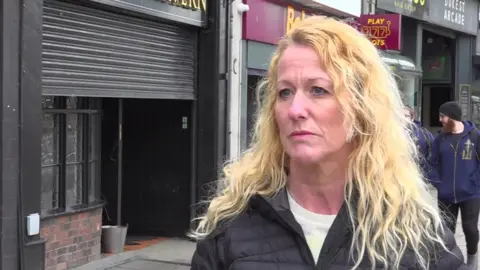
Council leader Huw Thomas said the city needed a cleaner transport system.
"The current levels of traffic in Cardiff are costing the average resident hundreds upon hundreds of pounds each year and holding our economy back," he said.
"That's on top of the environmental and health damage caused by congestion."
He said it was "imperative" the council created a transport system which connected everyone.
Transport charity Sustrans Cymru said it was a "positive step" that could reduce congestion and air pollution.
Fiona Kinghorn, executive director of public health of Cardiff and Vale University Health Board, said that air pollution has a "clear impact" on public health and any step to reduce the number of cars on the road would "be positive for health of all age groups".
"There is a clear impact of air pollution on people's health, from preconception right through to old age," she said.
"Reducing car use [also] has an impact on physical activity levels. And of course on climate change."
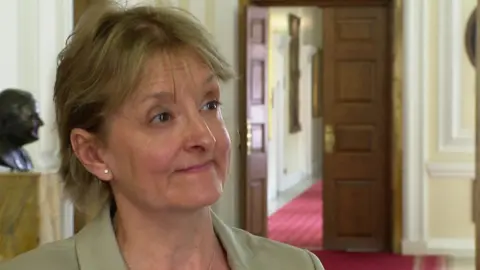
Mair Lewis, from Caerphilly, said: "I wouldn't want to pay it. I cycle into work [in Cardiff] a lot so I think I will just cycle to avoid it, weather permitting.
"Obviously we want to clean up our air but I don't think it will work, because if people are driving and are not fit enough or able enough to cycle then they are still going to drive in."
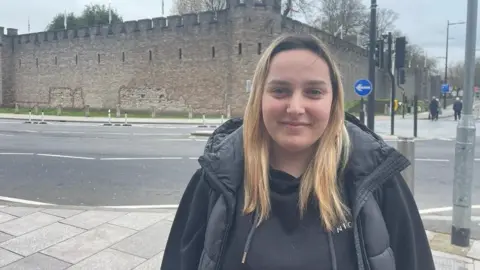
Sasha Hughes, from Porth, Rhondda Cynon Taf, gets the train into Cardiff to work and said a congestion charge would be "ridiculous".
"People will still drive because public transport is shocking. A lot of people in the Valleys I know do tend to work in Cardiff. It's better pay but I think if they have to pay that bit extra it's not worth them coming in."
Andy Jones, who rides a motorcycle in Cardiff, thinks a congestion charge would "kill the town".
"It's the same with the 20mph speed limit, it hasn't helped pollution but it takes longer to get places and costs people more," he said.
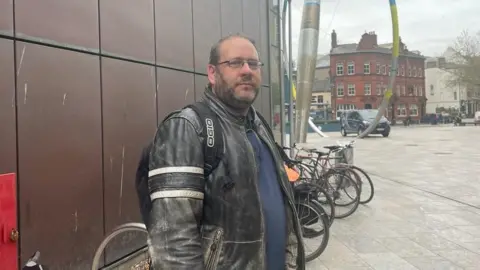
The council said £1 bus fares on key routes and better and expanded bus services would be available before any road user charge was introduced, as well as improvements to regional commuting.
Once any scheme was introduced, the money raised, alongside government funding contributions could then help fund a Metro city-wide tram system and new stations with a minimum of four trams an hour.
It could also fund improved bus services and the delivery of an electric bus and taxi fleet, the authority said.
Other long-term plans include the completion of the Eastern Bay Link and sustainable travel incentives such as travel discounts and bike purchase vouchers.
Welsh Conservative shadow minister for transport Natasha Asghar said the plan appeared to be "just another way to punish motorists", and claimed public transport links outside of Cardiff were too unreliable to be seen as viable alternatives.
"With the Labour government's backwards ban on road building, the impending rollout of 20mph speed limits, and vital financial support for buses coming to an end you can't help but feel that motorists are being targeted," she said.
She added that the congestion charge would be "a detriment to people's work life balance" due to a reliance on public transport that was "unreliable and constantly late".
Cardiff councillor Rodney Berman, of the Welsh Liberal Democrats, said the proposal should be put to a referendum for residents.
"Any proposal for a significant congestion charging scheme must have support from the people of the city," he said.
